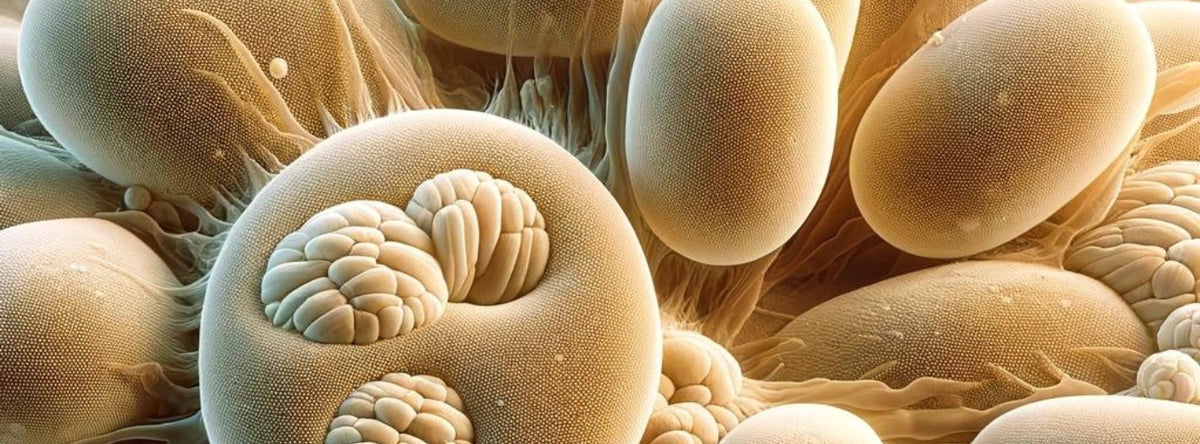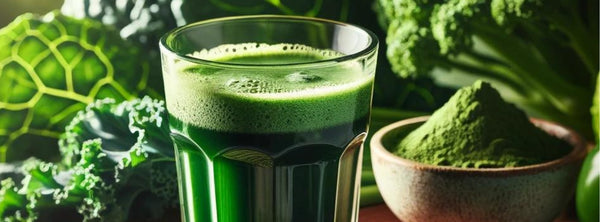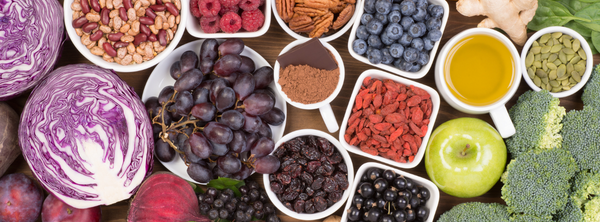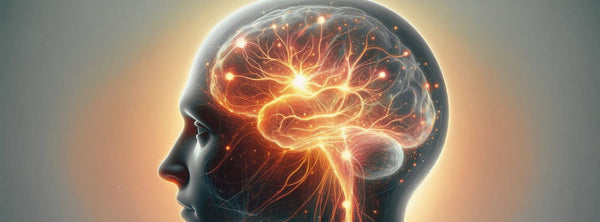
Candida, also know as Candidiasis, is a fungal infection caused by any of the species of Candida, but in particular Candida albicans. It is believed to affect 33% of people in the Western world.
The Candida species naturally occurs in small quantities within your digestive tract and its role is to help with the whole digestive process. The amount of Candida present in your intestinal tract is regulated and kept under control by your beneficial gut bacteria. Like all opportunistic organism, if the conditions are favourable they will proliferate and Candida is no different. An overgrowth of Candida can affect any part of your body causing a multitude of symptoms, illnesses and eventually disease.
As Candida grows within the intestinal tract it produces rhizoids, which are hook-shaped roots that pierce into your intestinal wall and break down the protective barriers between the intestines and your blood. This leads to leaky gut syndrome and allows antigens (foreign particles) to enter into your bloodstream. It also allows the Candida to release chemicals and toxic by-products that can cause damage to your body, tissues and organs. One of the main toxins produced by the Candida organism is acetaldehyde, a potent free radical substance that destroys cells and compromises immune function. Acetaldehyde is also the by-product of alcohol metabolism, which is believed to be the major cause of hangovers.
What causes Candida?
Your immune system is your body’s defence mechanism that governs or regulates the growth of any infection within your body whether that be fungal (candida), bacterial, parasitic or viral. A compromised immune system allows the opportunistic Candida organism to proliferate within any weakened or immune-compromised area of your body. Your beneficial gut bacteria, which make up a large portion of your intestinal immune system, are the main controller of the Candida within your gut. Unfortunately, the health of your beneficial bacteria is weakened or destroyed by antibiotics, the pill, stress, alcohol, cortisone medication and a nutrient dead, high sugar diet.
There are many things, including the above-mentioned, that can weaken, damage, suppress and eventually compromise your body’s immune function that may lead to Candida such as:
| Alcohol | Low fibre diet | |
| Antibiotics | Low stomach acid levels | |
| Antacids | Mercury filling leakage | |
| Birth control pill | Non-steroidal anti-inflammatory drugs | |
| Chlorinated drinking water | Nutrient dead foods | |
| Constipation | Overgrowth of intestinal bacteria, parasites & worms | |
| Cortisone medication | Pesticides and herbicides | |
| Diarrhoea | Poor diet | |
| Environmental toxins | Poor digestive enzyme levels | |
| Fluoridated water | Processed meats | |
| Food preservatives, additives, & artificial sweeteners | Protein pump inhibitors for heartburn & reflux | |
| Heavy metal exposure | Recreational drugs | |
| High sugar diet | Skipping meals | |
| Hormonal imbalances i.e. oestrogen & progesterone | Steroids | |
| Hormone and antibiotic fed meat | Stress | |
| Insomnia | Underactive thyroid | |
| Lack of rest | White flour products | |
| Lack of sunlight (vitamin D deficiency) |
Symptoms of Candida
Candida is capable of producing over 100 symptoms! This makes it extremely frustrating for anybody suffering from Candida to be able to find out, or understand, what is exactly wrong with them. The symptoms of Candida can also vary from one person to another, making a diagnosis from the symptoms more difficult.
Below is a list, but not an exhaustive one, of the main symptoms associated with Candida;
| Acne | Headaches |
| Abdominal distension bloating or pain | Heartburn or indigestion |
| Anxiety | Hives, rashes or itchy skin |
| Asthmatic symptoms | Hypoglycaemia (low blood sugar levels) |
| Athletes foot or jock itch | Impotence |
| Bad breath | Inflammation of the prostate or testicles |
| Belching or burping | Inflammation of the vagina or ovaries |
| Bladder infections | Intolerance of perfume, odours or tobacco smoke |
| Blisters in the mouth | Irritability or jitteriness |
| Brain fog | Joint pain or swelling |
| Burning or itching of the eyes | Kidney infections |
| Colic | Low sex drive |
| Constipation | Memory loss |
| Cravings for sugar, bread, sweets or alcohol | Meningitis |
| Chronic cough | Menstrual cramps or irregularities |
| Cystitis or urinary tract infections | Mood swings |
| Dark bags under eyes | Mucus in the stools |
| Depression | Muscle aches and pains |
| Diarrhoea | Nasal congestion or discharge |
| Drowsiness | Numbness burning or tingling |
| Ear pain, aches or discharge | Oedema |
| Eczema | Painful intercourse |
| Endometriosis | Pain or tightness in the chest |
| Erratic vision | PMS |
| Fatigue | Psoriasis |
| Feeling drained | Rectal itching or rash |
| Feeling of swelling or tingling in the head | Rosacea |
| Feeling spaced out | Sinus infections |
| Flu-like symptoms | Sore dry mouth |
| Food allergies or sensitivities | Sore or dry throat |
| Fungal infections of the skin or nails | Spots in front of the eyes |
| Gas or flatulence | Suicidal thoughts |
| General allergies | Thrush |
| Gingivitis and periodontal disease | Thyroid problems |
| Haemorrhoids | Vaginal itching, burning or persistent infections |
| Hair loss | Wheezing or shortness of breath |
| Hay fever | Whitecoat on tongue |
What worsens Candida?
Regardless of the Candida symptoms, they will generally worsen in hot, humid, damp and / or muggy weather.
The symptoms of Candida can also vary according to your diet. Sugar, alcohol, carbohydrate type foods, starches, fermented foods, sugar, foods containing sugar and white flour products will increase the symptoms as this feeds the Candida yeast organism. Feeding the Candida will cause them to grow and release more toxins, which produces more symptoms.
Stress in its many forms such as; not being able to cope, a large workload, financial problems, lack of downtime, too many things to do, lack of sleep and poor diet etc play a major role in down-regulating your body's immune defence system.
The environment in which we live can also play a major role if you are exposed to toxic metals such as mercury, lead and cadmium. Pollution, smoke, fumes, or contact with various chemicals can also compromise your immune function, once again allowing Candida to grow and thrive unchecked.
How To Treat Candida
When treating and removing Candida, you need to take a two-pronged approach. Firstly you need to eliminate the foods that the Candida live on which are the sugar, alcohol, white flour, carbohydrate and fermented foods while supplementing with anti-fungal herbs and probiotics. Some people may need additional liver support and digestive enzymes to help with dieback, which occurs when massive amounts of candida are destroyed. For some people in the short-term, dieback can exacerbate and worsen many of the symptoms of Candida, causing the sufferer to give up prematurely.
Trying to kill the Candida by diet alone can be a long and arduous task and for some people, this approach may not work. The best approach that we have found is to first weaken the Candida with the proper diet and then to attack it with antimicrobial herbs and probiotics to dramatically reduce their numbers. Secondly, we support your immune system to ultimately maintain a healthy balance.
Candida Eradication Protocol
If you have already been diagnosed with Candida but are unsure how to go about treating yourself, you may be interested in Candida Eradication Protocol. This health pack includes;
1. Free Candida Treatment Plan - A comprehensive guide developed by Naturopath Greg Newson, that provides the nutritional, dietary and lifestyle advice that Greg recommends to patients every day for the treatment of this condition.
Please note this treatment plan is only suitable for persons over 15 years of age.
2. Eating Right For Candida Recipe E-Book - with over 80 delicious, simple and everyday recipes specifically designed for the various stages of the Candida treatment program (Downloadable PDF).
3. Candida Supplement Pack - This pack includes the recommended supplements and dosages in the Candida Treatment Plan.
Please visit our store to purchase a Candida Eradication Protocol



